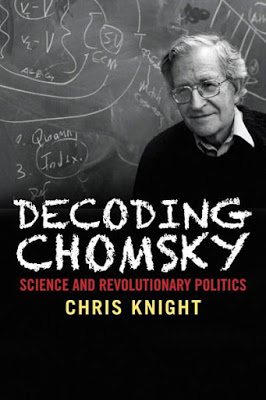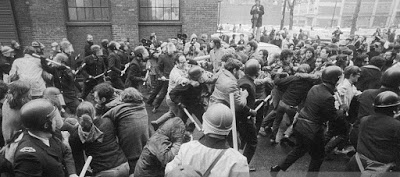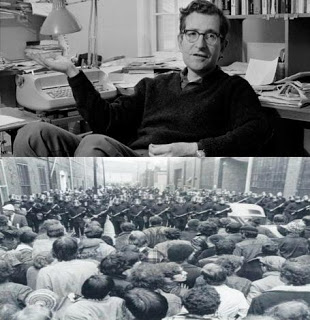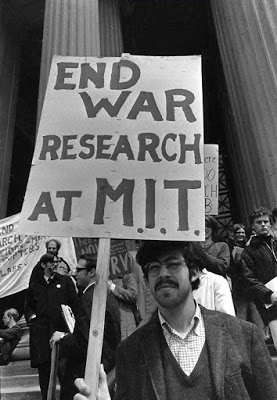Between the war scientists and the anti-war students
Responsibility of Intellectuals’. Few other writings had a
greater
impact on the turbulent political atmosphere on US campuses in the
1960s. The essay launched Chomsky’s political career as the world’s most
intransigent and cogent critic of US foreign policy – a position he has
held to this day.
No one could doubt Chomsky’s sincerity or his gratitude to the student
protesters who brought the war in Vietnam to the forefront of public
debate. On the other hand, he viewed the student rebels as ‘largely
misguided’, particularly when they advocated revolution.
Referring to the student and worker uprising in Paris in May 1968,
Chomsky recalls that he ‘paid virtually no attention to what was going
on,’ adding that he still believes he was right in this. Seeing no
prospect of revolution in the West at this time, Chomsky
went so far as to describe US students’ calls for revolution as
‘insidious’. While he admired their ‘challenge to the universities’, he
expressed ‘skepticism about how they were focusing their protests and
criticism of what they were doing’ – an attitude that
led to ‘considerable conflict’ with many of them.[1]
As is well known, Chomsky’s university was the Massachusetts Institute
of Technology, where he taught and researched linguistics in one of its
research laboratories funded by the military. Although he sometimes
understates MIT’s military role, Chomsky has never
made a secret of its Pentagon connections. Referring to the 1960s, he
explains that MIT was ‘about 90% Pentagon funded at that time. And I
personally was right in the middle of it. I was in a military lab. If
you take a look at my early publications, they
all say something about Air Force, Navy, and so on, because I was in a
military lab, the Research Lab for Electronics.'[2]
By the late 1960s, MIT’s various laboratories and departments were
researching helicopter design, radar, smart bombs and counterinsurgency
techniques for the ongoing war in Vietnam. In Chomsky’s words: ‘There
was extensive weapons research on the MIT campus.
… In fact, a good deal of the [nuclear] missile guidance technology
was developed right on the MIT campus and in laboratories run by the
university.'[3] One of the radical student newspapers of the time,
The Old Mole, expressed things still more
bluntly:
‘MIT isn’t a center for scientific and social research
to serve humanity. It’s a part of the US war machine. Into MIT flow
over $100 million a year in Pentagon research and development funds,
making it the tenth largest Defense Department R&D contractor
in the country. MIT’s purpose is to provide research, consulting
services and trained personnel for the US government and the major
corporations – research, services, and personnel which enable them to
maintain their control over the people of the
world.'[4]
In the light of this, it is hardly surprising that, according to one
former MIT student, ‘most radical students, as well as many liberal
students, wanted first and foremost to stop the war research.'[5] But in
1969, in a contribution to an official MIT report,
Chomsky took a significantly different position. Resorting to the
language of defense and deterrence favoured by the university’s war
scientists, he proposed that, rather than closing down the military
laboratories, ‘they should be restricted to research on
systems of a purely defensive and deterrent character.’ One of the
leading student activists at MIT at the time, Michael Albert, later
described Chomsky’s cautious position as, in effect, ‘preserving war
research with modest amendments.'[6] (I should point
out, however, that despite their disagreements, Albert remains
supportive of Chomsky to this day, as do other student radicals who have
known Chomsky personally over the years.)
Back in 1969, MIT’s student radicals were keen to take direct action
against the university’s war research by, among other things, occupying
the office of its president, Howard Johnson. Again, Chomsky took a
different position and at one point, according to
one of his academic colleagues, he joined with other professors in
standing in Johnson’s office to prevent the students from occupying it.
As he said later about the 1960s student tactic of occupation, ‘I wasn’t
in favor of it myself, and didn’t like those
tactics.'[7]
MIT’s radicals not only organised occupations, they also organised a
mass picket of the university’s nuclear missile laboratories. Determined
to put a stop to this kind of disruption, the university eventually had
six students sentenced to prison terms.[8]
One of these students, George Katsiaficas, served time for the crime of
‘disruption of classes’. To this day, he remains indignant about his
treatment and says that the phrase, the ‘banality of evil’ – famously
used by Hannah Arendt to describe Nazi war criminals
– applies equally to President Howard Johnson. Adopting a quite
different tone, however, Chomsky told Time magazine
that Johnson was an ‘honest, honourable man’ and it seems he even
attended a faculty party held to celebrate Johnson’s success at
containing
the student protests.[9]
Chomsky has acknowledged that some students did suffer from incidents
‘that should not have happened’. But, while student leader Michael
Albert described MIT as another ‘Dachau’ whose ‘victims burned in the
fields of Vietnam’, Chomsky has again and again defended
the university’s role.[10] In view of the imprisonments, expulsions and
job losses suffered by MIT’s radicals, it is hard to know what to make
of Chomsky’s claim that MIT’s anti-war activists ‘had no problems’ from
the university. Nor is it easy to recognise
his description of MIT as ‘one of the most free universities in the
world’ with ‘the best relations between faculty and students than at any
other university.'[11]
CHOMSKY AND THE WAR CRIMINALS
Still more puzzling was Chomsky’s attitude when Walt Rostow visited MIT
in 1969. Rostow was one of those prominent intellectuals whom Chomsky
had so eloquently denounced in his ‘Responsibility of Intellectuals’
article. As an adviser to both President John
Kennedy and President Lyndon Johnson, Rostow had been one of the main
architects of the war in Vietnam. In particular he was the strategist
responsible for the carpet bombing of North Vietnam.
Against this background, it was hardly surprising that when Rostow
arrived at MIT, his lecture was disrupted by students furious at his
presence on their campus.[12] Far from associating himself with such
student rage, however, when Chomsky heard that Rostow
was hoping to return to his former job at MIT, he actually welcomed the
prospect. Then, when he heard that the university was poised to reject
Rostow’s job application for fear of more student disruption, Chomsky
went to Howard Johnson and threatened to lead
MIT’s anti-war students to ‘protest publicly’ – not against – but
in favour of Rostow being allowed back to the
university.[13]
Rostow wasn’t the only powerful militarist at MIT to receive support
from Chomsky. Twenty years later, Chomsky was, as he says, ‘one of the
very few people on the faculty’ who supported John Deutch’s bid to
become university President.[14] Deutch was particularly
controversial because, as MIT’s radical newspaper, The
Thistle, explained, he was both an ‘advocate of US nuclear
weapons build-up’ and ‘a strong supporter of biological weapons, and of
using chemical and biological weapons together in order to increase
their killing efficiency.’ In fact, by the late 1980s, Deutch had not
only brought chemical and biological weapons research to MIT, he had
apparently ‘pressured junior faculty into performing this research on
campus’.[15]
Fearing that the university was about to become even ‘more
militaristic’, MIT’s radicals – with the notable exception of Chomsky –
joined others on the faculty to successfully block Deutch’s appointment.
Then, later, when President Clinton made Deutch No.2
at the Pentagon and, in 1995, Director of the CIA, student activists
demanded that MIT cut all ties with him. Chomsky once again disagreed,
The New York Times reporting him as saying of
Deutch that ‘he has more honesty and integrity than anyone I’ve
ever met in academic life, or any other life…. If somebody’s got to
be running the CIA, I’m glad it’s him.'[16] Of course, the most
remarkable thing about all this is that, throughout this entire period,
Chomsky was churning out dozens of brilliantly argued
articles and books denouncing the CIA and the US military as criminals,
their hands dripping in blood.
One way of making sense of Chomsky’s various contradictory positions is
to view them in the light of the public statements made by MIT’s
managers at the height of the student unrest in 1969. At this time,
President Howard Johnson described his university as
‘a refuge from the censor, where any individual can pursue truth as he
sees it, without any interference.'[17] Underlying such statements was
Johnson’s anxiety lest MIT’s war scientists suffer ‘interference’ from
protesting students and Johnson himself wasn’t
too consistent in defending this position, readily abandoning it when
he declined Rostow’s request to return to MIT. Unlike Johnson, however,
Chomsky stuck to the university’s principles. He remained true to the
MIT’s non-interference stance, even to the point
of defending the right of a potential war criminal, John Deutch, and an
actual ‘war criminal’ (Chomsky’s description of Walt Rostow) to hold
important posts at the university.[18]
Part of the explanation for all this may have been Chomsky’s reluctance
to fall out with fellow faculty members, especially those with whom he
associated regularly. As he remarked at one point, ‘I’m always talking
to the scientists who work on missiles for
the Pentagon.'[19] But there must have been more to Chomsky’s thinking
than this.
In 1969, one MIT student is reported to have justified his opposition to
the university’s military research on the grounds that ‘one doesn’t
have the right to build gas chambers to kill people’, adding that ‘the
principle that people should not kill other people
is more important than notions of freedom to do any kind of research
one might want to undertake.'[20] Chomsky, by contrast, extended the
principle of academic non-interference to unusual lengths. It was
crucial to him that MIT held strictly to the management
ideal of the university as ‘a refuge from the censor’. After all, a
less libertarian policy might have undermined his own conflicted
position as an anti-war campaigner working in a laboratory funded by the
US military.
None of this makes Chomsky’s opposition to US militarism any less
genuine or admirable. If anything, his dissidence was all the more
remarkable given the context in which it was expressed. My aim here is
simply to highlight how conflicted Chomsky must
have felt, being a committed anti-militarist in an institution so
closely associated with a war machine that was inflicting so much death
and misery across the globe.
Chomsky’s moral qualms were particularly apparent at the height of the
war in Vietnam when, in October 1968, Chomsky told The New
York Times that he felt ‘guilty most of the time’.[21] One
way to assuage this guilt might have been to resign and, as
it happens, around the time that the New York Review of
Books published ‘The Responsibility of Intellectuals’ in its
February 1967 edition, Chomsky was thinking of doing just that. The
March edition of the Review included a letter from
Chomsky
saying he had ‘given a good bit of thought to … resigning from MIT,
which is, more than any other university associated with the activities
of the Department of “Defense”‘. However, Chomsky soon had second
thoughts which he expressed in a follow-up letter
published in the April edition. Whereas in his original letter he had
complained that MIT’s ‘involvement in the war effort is tragic and
indefensible’, in the follow-up he claimed – in a surprising about-turn –
that ‘MIT as an institution has no involvement
in the war effort. Individuals at MIT, as elsewhere, have direct
involvement and that is what I had in mind.'[22]
So it appears that, despite his sincere and often courageous opposition
to the US military, Chomsky felt a simultaneous pull in the opposite
direction, prompting him to tone down criticisms of MIT in order to
protect his ability to continue with the job he
loved. My own view is that the intensity of Chomsky’s anti-militarist
dissidence can be explained in part by his need to square his continued
MIT employment with a political conscience that refused to lie
down.
I have no space in a short article to explain how such moral dilemmas
influenced not only Chomsky’s political work but also his linguistics.
Suffice it to say that Chomsky was hired to work at MIT by Jerome
Wiesner, a military scientist who, in the 1950s, was
arguing ‘fervently for developing and manufacturing ballistic
missiles.’ Wiesner was an adviser both to the CIA and to President
Eisenhower and it is hard to think of anyone in US academia who was more
deeply involved in both the technology and the decision
making of nuclear war than he was.[23]
Wiesner initially employed Chomsky because, as he said, ‘[We wanted to]
use computers to do automatic translation, so we hired Noam Chomsky and
Yehoshua Bar-Hillel to work on it.’ In this Cold War period, the US
military were investing millions of dollars in
linguistic research not only to automatically translate Eastern bloc
documents but also to enhance their computer systems of ‘command and
control’ both for nuclear war and, later, for the war in
Vietnam.[24]
Chomsky, therefore, found himself from the very beginning of his career
working in a largely conservative institutional milieu among colleagues
more or less happy to conduct advanced weapons research. Given his own
political commitments, on the other hand,
he needed to ensure that his own particular contribution would not
assist the military in any way. He solved this problem by extricating
linguistics from practicalities altogether. Language, under Chomsky’s
novel definition, became non-communicative, non-social
and, in effect, little more than a Platonic abstraction. In short, for
fifty years, much of linguistics was driven into an academic dead-end
from which it has taken decades to emerge. But all that is another story
….[25]
Chris Knight is author of Decoding Chomsky: Science and revolutionary politics (Yale University Press, 2016).
NOTES
1. R.Barsky, Noam Chomsky, a life of dissent, p122, 131.
2. G.D.White, Campus Inc., p445.
3. M.Albert, Remembering Tomorrow, p97-99; C.P.Otero, Noam
Chomsky: Language and Politics (2004), p216. Any
university that restricted its research to the development of military
technology would soon run out of new ideas so MIT does a lot of pure
science, including linguistics. But, as Michael Albert says,
‘War blood ran through MIT’s veins. It flooded the research facilities
and seeped even into the classrooms.’ In the late 1960s, some 500
students worked in MIT’s military laboratories. Most of these students
worked in the Instrumentation Laboratories that
were part of the engineering school and which, in Chomsky’s words, were
only ‘two inches off campus’ with people going ‘between them all the
time’. MIT also did military research ‘on campus’ for both the Navy and
the CIA. Albert p99; MIT
Review Panel on Special Laboratories, Final Report, p59-69; Works And Days 51-4: Vol. 26/27, 2008-09, p533; <em>MIT
Bulletin
, Report of the President, 1969, p237-40, 255; The Tech, 31/10/69, p1, 10.
4. ‘Why
Smash MIT?’, in I.Wallerstein, The University
Crisis Reader, Vol.2 p240-3; Albert p113-4.
5. Stephen Shalom, New Politics, Vol.6(3).
6. MIT Review Panel on Special Laboratories, Final Report, p37-8; Albert p98.
7. J.Segel, Recountings; Conversations with MIT mathematicians, p206-7; N.Chomsky, ‘MIT 150 Infinite History Project’.
8. The Tech, 14/12/71, p8 and The Tech, 4/8/72, p1.
9. www.eroseffect.com/articles/holdingthecenter.pdf</a>; Time, 21/11/69 p68 and 15/3/71
p43; H.Johnson, Holding the Center, p202-3.
10. N.Chomsky, Chomsky on Democracy and Education,
p311; Albert p9, 16. Chomsky’s discomfort with any kind of illegal or
confrontational action at MIT was shown again, in 2011, when the
university cooperated with the prosecution of Aaron Swartz for
the ‘crime’ of downloading Jstor journals from MIT’s library. Although
Jstor agreed to a deal whereby Swartz would avoid prison, MIT apparently
rejected this deal and the threat of decades in prison helped drive
Swartz to suicide. When asked about this tragic
event, Chomsky did say that MIT should have acted differently. However
he also implied that Swartz should have been prosecuted – if only for a
‘misdemeanour’ – and he then said: ‘If you take Jstor and make it
public, Jstor goes out of business … [and] nobody
has access to the journals. … You can’t just liberate things,
pretending you don’t exist in the [capitalist] world.’ ‘Noam Chomsky at the British Library’ (video, at 1hr.30mins.); The
Boston Globe, 15/1/13; The Atlantic, 30/7/13. See also: ‘Passing
Noam on My Way Out, Part 2: Chomsky vs. Aaron Swartz’.
11. The Tech, 14/12/71, p8; N.Chomsky, Class Warfare (1999), p137; White p445-6; R.Chepesiuk,
Sixties Radicals, p145; S.Diamond, Compromised
Campus, p284-5.
12. D.Milne, America’s Rasputin; The Tech, 11/4/69, p1, 8.
13. Barsky p141; >’TV debate between Noam Chomsky and William Buckley’.
14. Chomsky, Class Warfare, p135-6.
15. The Tech, 7/3/89</a>, p2, 16 and 27/5/88, p2, 11; The Thistle, Vol.9
No.7.
16. The Thistle, Vol.9 No.7; The New York Times, 10/12/95.
17. <em>MIT Bulletin
, Report of the President, 1969, p3.
18. J.Wiesner, Jerry Wiesner, p582; Johnson p189-90; Barsky p141.
19. N.Chomsky, Understanding Power
(2013), p10.
21. The New York Times, 27/10/68.
22. New York Review of Books, 25 March and April
1967.
23. The New York Times, 23/10/94; D.Welzenbach, ‘Science
and Technology: Origins of a Directorate’, p16, 21; L.Smullin, ‘Jerome Bert Wiesner, 1915-1994, A Biographical Memoir’, p 1, 7-10, 20; D.L.Snead, Eisenhower and the Gaither Report, p189; M.Rosenberg, Plans and Proposals for the Ballistic
Missile Initial Operation Capability Progam, piii-iv, 6-11, 17-22.
24. S.Garfinkel, ‘Building 20, A Survey’; J.Nielsen, ‘Private
Knowledge, Public Tensions:
Theory commitment in postwar American linguistics’, p 39-42,
194, 338-42; F.J.Newmeyer, The Politics of
Linguistics, p84-6. Wiesner went on to say, ‘It didn’t take
us long to realize that we didn’t know much about language. So we went
from automatic
translation to fundamental studies about the nature of language.’
Wiesner later became critical of US policy on both nuclear weapons and
on the Vietnam war but this did not stop him from continuing to oversee
MIT’s huge military research program which he,
naturally, justified on the grounds of ‘academic freedom’.
The Tech, 28/4/72, p5; L.Kampf, ‘The University in American Power’ (audio, at 48mins.).
25. Another academic dead-end, in the form of postmodernism, befell
cultural theory and it is notable that MIT also played a formative role
in that intellectual disaster. See: B.Geoghegan, ‘From
Information Theory to French Theory’, Critical Inquiry 38 (2011).



